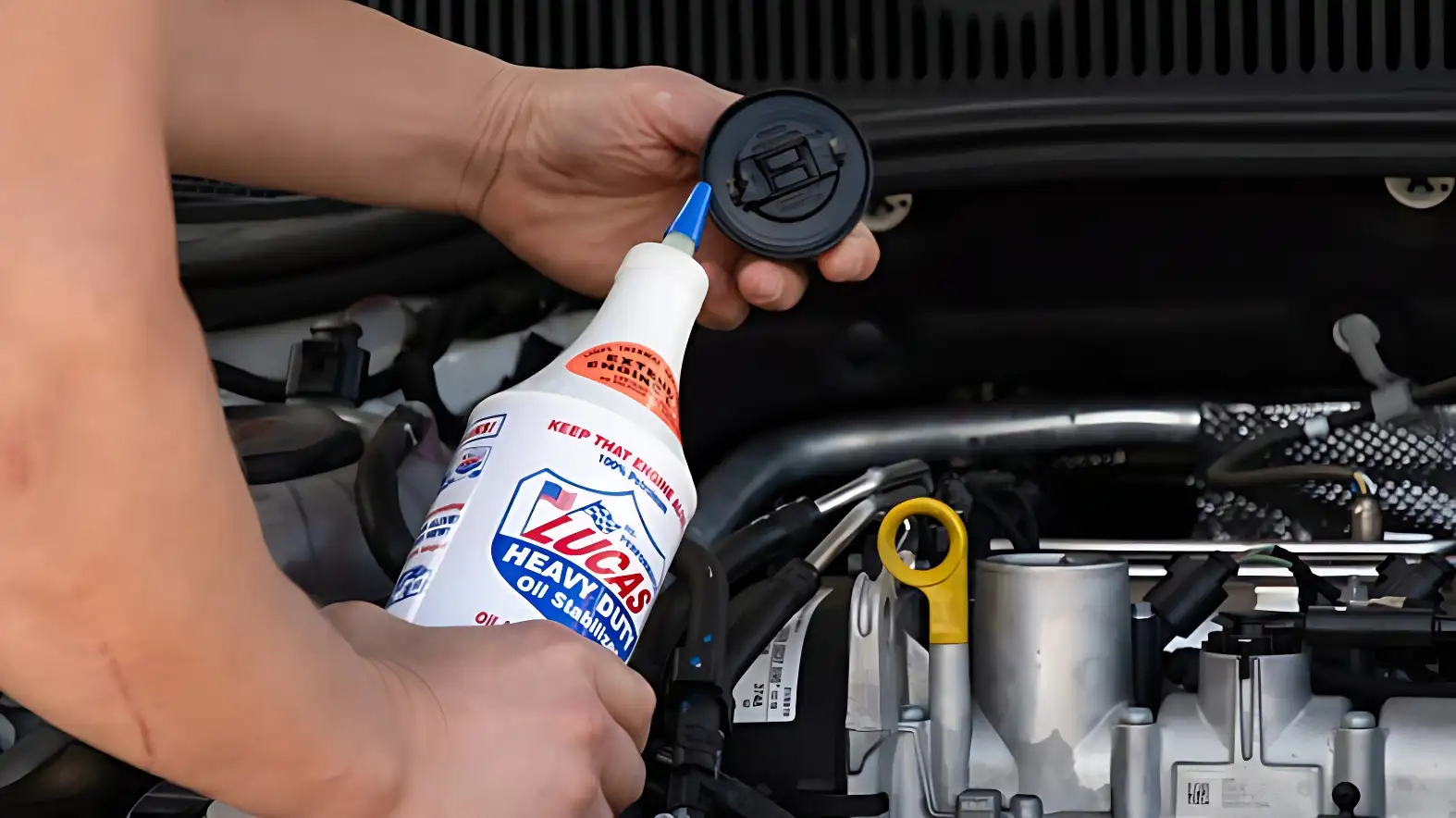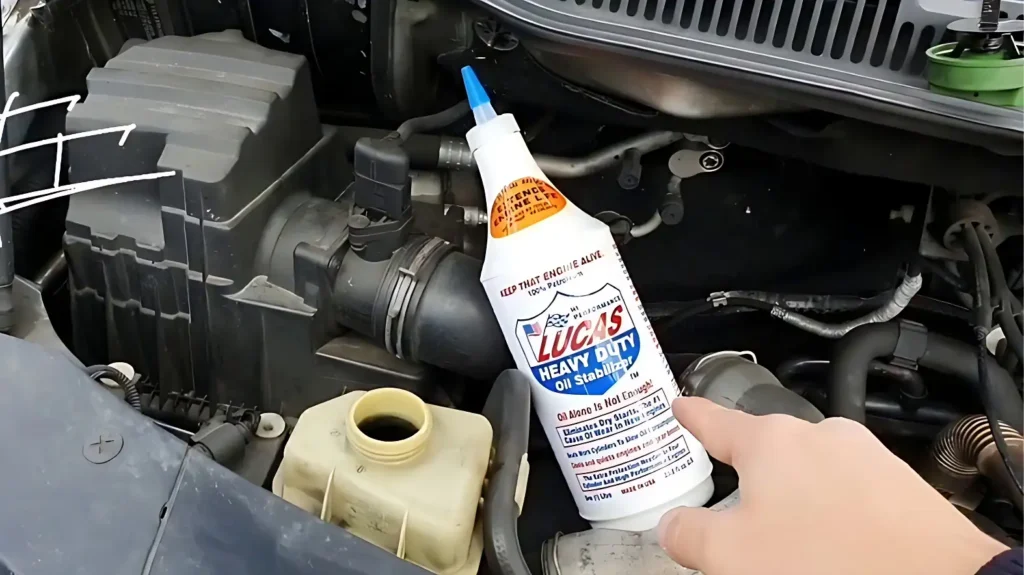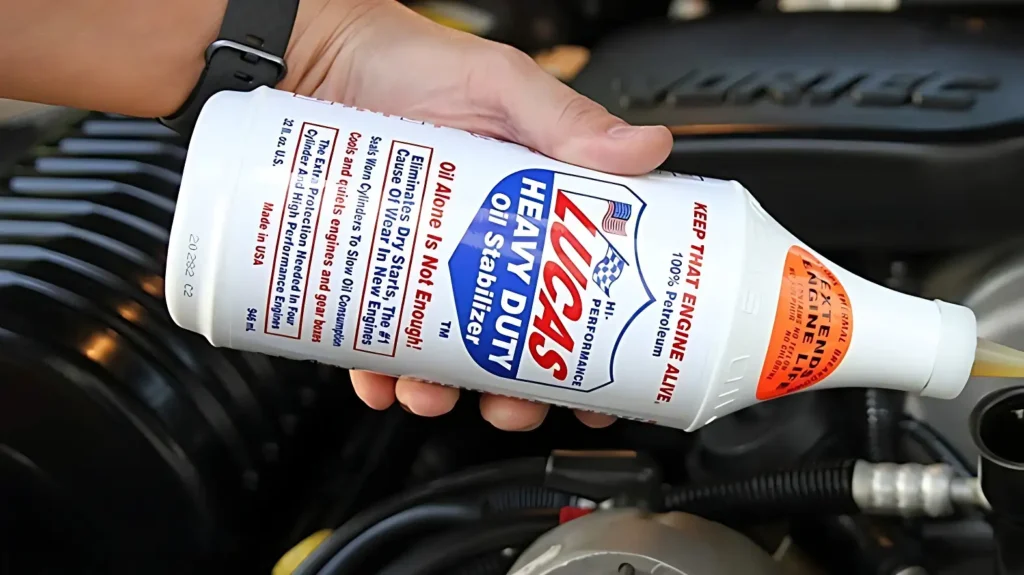Lucas Oil Stabilizer is a great product to make sure your engine gets the protection it needs. It can reduce engine wear, boost efficiency, and extend engine life.
This blog provides a comprehensive guide on how to use Lucas Oil Stabilizer, how to choose the right type, the benefits of using it, and when to use it for maximum results.

How to Use Lucas Oil Stabilizer?
Here is a step by details procedure for using Lucas Oil Stabilizer:
Choosing the Right Type of Stabilizer
Before using Lucas Oil Stabilizer, make sure you choose the right type for your vehicle. Lucas Oil Stabilizer comes in two types: regular and synthetic.
If you use synthetic engine oil, you should choose the synthetic version of Lucas Oil Stabilizer.
Preparing Your Engine
To get your engine ready for the Lucas Oil Stabilizer, you should drive it for a few minutes to warm it up.
This will help to make the oil thinner and easier to mix with the stabilizer.
Determine the Correct Amount to Use
The amount of Lucas Oil Stabilizer you need to use depends on the type of engine you have.
As a general rule, you should use one quart of Lucas Oil Stabilizer for every five quarts of oil in your engine.
It is always recommended to consult the product label or your vehicle owner’s manual for specific instructions on the amount of Lucas Oil Stabilizer to use.
This will ensure that you are using the correct amount for your particular engine and can maximize the benefits of the product.
Add the Stabilizer to Your Engine
After determining the correct amount of Lucas Oil Stabilizer to use, it’s time to add it to your engine.
First, make sure your engine is cool and turned off. Then, remove the oil cap and pour the Lucas Oil Stabilizer into the engine. Use a funnel if necessary to avoid spills.
Start Your Engine and Let it Idle
“After adding the Lucas Oil Stabilizer to your engine, start the engine and let it idle for approximately 15 minutes.”
This will allow the stabilizer to circulate throughout the engine and provide maximum protection to the components.
Check Your Oil Level
After letting the engine run at idle for 15 minutes, turn off the engine and wait for a few minutes to allow the oil and the Lucas Oil Stabilizer to settle.
This will ensure that the stabilizer is evenly distributed throughout the oil and that it can provide maximum protection and performance benefits to your engine.
Then, check your oil level using the dipstick. If necessary, add more oil to bring it to the correct level.
Monitor Your Engine’s Performance
Now that you’ve added Lucas Oil Stabilizer to your engine, it’s important to monitor its performance.
You should notice improvements in engine noise, smoother operation, and better fuel efficiency.
Keep an eye on your oil level and change your oil at the recommended intervals.
How to Choose the Right Lucas Oil Stabilizer for Your Engine?

We will guide you through the procedures of selecting the appropriate Lucas Oil Stabilizer for your engine:
Determine the Oil Viscosity of Your Engine
Determine your engine oil’s viscosity before choosing a Lucas Oil Stabilizer. To properly lubricate and protect your engine, choose the right oil viscosity.
Your owner’s manual or mechanic can assess your engine oil’s viscosity. After you know your engine oil viscosity, you can choose the proper Lucas Oil Stabilizer.
Consider the Type of Engine
Another important element in choosing a Lucas Oil Stabilizer is engine type.
It’s important to choose an oil stabilizer that’s customized to your engine’s configuration, components, and operating conditions because engines vary greatly.
If you have a high-capacity engine that operates at high temperatures and pressures, you must use an oil stabilizer that can withstand these conditions.
However, if you have an old, high-mileage engine, add an oil stabilizer to reduce abrasion and improve performance.
Determine the Purpose of Using Lucas Oil Stabilizer
The Lucas Oil Stabilizer’s purpose is another consideration. Lucas Oil Stabilizers reduce engine abrasion, boost efficiency, and extend engine life.
Use an oil stabilizer designed to reduce engine wear. To optimize performance, you need an oil stabilizer that boosts engine power and fuel economy.
Consider the Climate and Operating Conditions
The climate and operating conditions of your engine are another critical factors to consider when choosing the right Lucas Oil Stabilizer.
Engines that operate in extreme temperatures, such as very hot or very cold conditions, require an oil stabilizer that’s designed to provide maximum protection and lubrication in these conditions.
Additionally, if you frequently drive in stop-and-go traffic or engage in heavy hauling or towing, you’ll need an oil stabilizer that’s designed to provide extra protection and lubrication under these demanding conditions.
Choose the Right Product and Amount
Once you’ve considered all the above factors, it’s time to choose the right Lucas Oil Stabilizer for your engine.
Lucas Oil offers a variety of oil stabilizer products designed for different engine types and purposes, so be sure to choose the one that matches your engine’s needs.
You’ll also need to determine the correct amount of oil stabilizer to use, which will vary depending on your engine’s size and the type of product you choose.
Consult the product’s instructions or consult with your mechanic to ensure you’re using the right amount.
How Often to Use Lucas Oil Stabilizer?

Assess the Condition of Your Engine
Before you start using Lucas Oil Stabilizer, it is crucial to assess the current condition of your engine.
If your engine is in good condition and you use high-quality motor oil, you may not need to use Lucas Oil Stabilizer frequently.
However, if your engine is showing signs of wear and tear or is older, using Lucas Oil Stabilizer regularly can help to improve its performance.
Determine the Type of Vehicle You Own
The frequency at which you should use Lucas Oil Stabilizer also depends on the type of vehicle you own.
For instance, if you own a high-performance car, you may need to use Lucas Oil Stabilizer more frequently than if you own a regular passenger vehicle.
Similarly, if you own a heavy-duty truck, you may need to use Lucas Oil Stabilizer more frequently to keep your engine in top condition.
Consider the Type of Driving You Do
The frequency at which you should use Lucas Oil Stabilizer also depends on the type of driving you do.
If you do a lot of city driving, your engine may accumulate more wear and tear, and you may need to use Lucas Oil Stabilizer more frequently.
Conversely, if you do a lot of highway driving, your engine may accumulate fewer contaminants, and you may not need to use Lucas Oil Stabilizer as often.
Follow the Manufacturer’s Recommendations
It is also essential to follow the manufacturer’s recommendations when using Lucas Oil Stabilizer.
The manufacturer’s recommendations will give you an idea of how often you should use the product for optimal results.
Typically, the manufacturer will recommend using Lucas Oil Stabilizer every oil change or every 3,000 miles.
Benefits of Using Lucas Oil Stabilizer
Enhanced Engine Protection
Lucas Oil Stabilizer is an excellent choice for protecting your engine against wear and tear.
The said additive was created with the intention of curbing the level of friction that emerges amid metallic components, resulting in the reduction of heat generation during the operation of the engine.
By reducing heat and friction, Lucas Oil Stabilizer helps to prevent premature engine wear and tear, extending the life of your engine.
Improved Fuel Efficiency
Lucas Oil Stabilizer can also help improve fuel efficiency by reducing the amount of energy that is lost due to friction in your engine.
When your engine runs more smoothly, it requires less fuel to operate, which can lead to significant savings at the gas pump.
Additionally, this product is designed to help maintain oil viscosity, even under high temperatures and pressure, which can further improve fuel economy.
Reduced Engine Noise
Another benefit of using Lucas Oil Stabilizer is reduced engine noise.
This product is formulated with an advanced friction modifier that helps to reduce the amount of noise that is generated during engine operation.
This can make for a smoother, quieter ride, which can be especially important if you have an older vehicle or one with a high-performance engine.
Increased Engine Power and Performance
Finally, Lucas Oil Stabilizer can help increase engine power and performance.
By reducing friction and wear, this product helps to ensure that your engine is operating at peak efficiency.
This can lead to increased horsepower, better acceleration, and improved overall performance.
Quieter operation:
The reduction of friction and wear can also result in a quieter operation of your engine.
When to Use Lucas Oil Stabilizer
You can use Lucas Oil Stabilizer at any time during your vehicle’s lifespan, but there are a few situations when it can be especially beneficial. These include:
High mileage engines:
If your engine has a lot of miles on it, using Lucas Oil Stabilizer can help to reduce wear and prolong its lifespan.
Racing or heavy-duty use:
If you use your vehicle for racing, towing, or other heavy-duty purposes, Lucas Oil Stabilizer can help to protect your engine against extreme conditions.
Noisy engines:
If your engine is making a lot of noise due to wear or other issues, using Lucas Oil Stabilizer can help to quiet it down.
Tips for Using Lucas Oil Stabilizer
Here are some tips to keep in mind when using Lucas Oil Stabilizer:
Follow the Manufacturer’s Instructions
Always follow the manufacturer’s instructions when using Lucas Oil Stabilizer.
The suggested quantity of Lucas Oil Stabilizer may fluctuate depending on the kind of automobile and the magnitude of its engine.
Use the Right Amount
Using too much or too little Lucas Oil Stabilizer can affect its performance. Make sure to measure the recommended amount carefully.
Check Your Oil Level Regularly
After using Lucas Oil Stabilizer, it’s important to check your oil level regularly to make sure it’s not overfilled or underfilled.
Use in Every Oil Change
To get the best results, it’s recommended to use Lucas Oil Stabilizer in every oil change.
Store in a Cool, Dry Place
To maintain its effectiveness, store Lucas Oil Stabilizer in a cool, dry place away from direct sunlight.
FAQs
Is Lucas Oil Stabilizer Compatible With Synthetic Engine Oil?
Yes, Lucas Oil Stabilizer is compatible with all types of engine oil, including synthetic, semi-synthetic, and conventional.
How Often Should I Use Lucas Oil Stabilizer?
To get the best results, it’s recommended to use Lucas Oil Stabilizer in every oil change.
Can I Use Too Much Lucas Oil Stabilizer?
Yes, using too much Lucas Oil Stabilizer can affect its performance.
Always measure the recommended amount carefully.
Can Lucas Oil Stabilizer Fix A Noisy Engine?
Using Lucas Oil Stabilizer can help to quiet down a noisy engine caused by wear or other issues.
Where Should I Store Lucas Oil Stabilizer?
To maintain its effectiveness, store Lucas Oil Stabilizer in a cool, dry place away from direct sunlight.
Conclusion
Lucas Oil Stabilizer can be a valuable addition to your vehicle’s maintenance routine. It can improve performance, extend lifespan, and protect against wear and tear.
By following the manufacturer’s instructions and using it in every oil change, you can experience the benefits of Lucas Oil Stabilizer for yourself.
